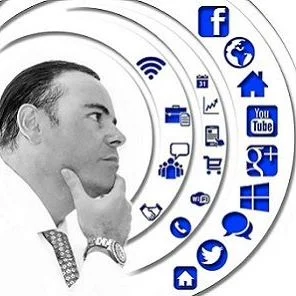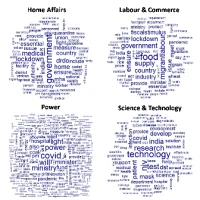Social media has dramatically altered the way many of us interact and connect with one another both personally and professionally. The widespread use of these new communication technologies, however, has created a number of potential ethical and legal challenges. This one question, for example: Is it okay to be Facebook friends with your doctor?
Two Loyola University Chicago Stritch School of Medicine professors tackle this issue in a recent AMA Journal of Ethics article titled "Why Can't We Be Friends? A Case-Based Analysis of Ethical Issues with Social Media in Health Care". Kayhan Parsi, JD, PhD, and Nanette Elster, JD, MPH, who are part of Loyola's Neiswanger Institute for Bioethics, discuss the good, the bad, and the ugly of social media and healthcare.
"Maintaining privacy and confidentiality are integral to the patient-healthcare professional relationship, since preserving patient trust is essential for competent clinical care," the authors write. "The use of social media in healthcare raises a number of issues about professional and personal boundaries, and the integrity, accountability, and trustworthiness of healthcare professionals."
Parsi and Elster cite five case studies to highlight possible ethical and legal issues that arise with the use of social media in healthcare. The cases address topics such as posting work-related photos on Facebook, tweeting personal or political opinions, and Googling patients and prospective candidates for jobs. The article analyses questions like: is it appropriate for healthcare professionals to friend a patient on Facebook, or even connect through LinkedIn?
See Also: Social Media May Hold Clues to Health Information
"When it comes to social media it's important for healthcare professionals to be aware of personal and professional boundaries. When someone reads a post, do they see it is as a statement from a physician, or an individual? These lines are easily blurred on social media," Parsi explained.
The authors say the challenge for doctors and other healthcare professionals is how to use social media in a responsible and thoughtful way.
The article also highlights benefits of social media in healthcare, including more rapid response to public health emergencies and better communication about pharmaceutical and other recalls.
"We also see that social media makes healthcare institutions more personal and more human," Elster noted. "Patients feel they can engage with the hospital or their doctor's office and they want to tell their stories."
The article provides recommendations for health organisations in creating guidelines and finding ways to use these social media to promote good outcomes. Key recommendations include:
See Also: Mayo Clinic and Hootsuite: Staff Social Media Training
Source: Loyola University Health System
Image credit: Pixabay
Two Loyola University Chicago Stritch School of Medicine professors tackle this issue in a recent AMA Journal of Ethics article titled "Why Can't We Be Friends? A Case-Based Analysis of Ethical Issues with Social Media in Health Care". Kayhan Parsi, JD, PhD, and Nanette Elster, JD, MPH, who are part of Loyola's Neiswanger Institute for Bioethics, discuss the good, the bad, and the ugly of social media and healthcare.
"Maintaining privacy and confidentiality are integral to the patient-healthcare professional relationship, since preserving patient trust is essential for competent clinical care," the authors write. "The use of social media in healthcare raises a number of issues about professional and personal boundaries, and the integrity, accountability, and trustworthiness of healthcare professionals."
Parsi and Elster cite five case studies to highlight possible ethical and legal issues that arise with the use of social media in healthcare. The cases address topics such as posting work-related photos on Facebook, tweeting personal or political opinions, and Googling patients and prospective candidates for jobs. The article analyses questions like: is it appropriate for healthcare professionals to friend a patient on Facebook, or even connect through LinkedIn?
See Also: Social Media May Hold Clues to Health Information
"When it comes to social media it's important for healthcare professionals to be aware of personal and professional boundaries. When someone reads a post, do they see it is as a statement from a physician, or an individual? These lines are easily blurred on social media," Parsi explained.
The authors say the challenge for doctors and other healthcare professionals is how to use social media in a responsible and thoughtful way.
The article also highlights benefits of social media in healthcare, including more rapid response to public health emergencies and better communication about pharmaceutical and other recalls.
"We also see that social media makes healthcare institutions more personal and more human," Elster noted. "Patients feel they can engage with the hospital or their doctor's office and they want to tell their stories."
The article provides recommendations for health organisations in creating guidelines and finding ways to use these social media to promote good outcomes. Key recommendations include:
- Have a clear understanding of local, state, and national laws concerning privacy.
- Have a working knowledge of professional society guidelines.
- Be prepared to make changes to stay current with the rapid developments in technology.
- Circulate policies, including updates, in writing to all who are required to abide by them.
See Also: Mayo Clinic and Hootsuite: Staff Social Media Training
Source: Loyola University Health System
Image credit: Pixabay
References:
Parsi K and Elster N (2015) Why Can’t We Be Friends? A Case-Based Analysis of Ethical Issues with Social Media in Health Care. AMA Journal
of Ethics. November 2015, Volume 17, Number 11: 1009-1018. doi:
10.1001/journalofethics.2015.17.11.peer1-1511
Latest Articles
healthmanagement, social media, privacy, public health, guidelines, confidentiality, ethical problems
A recent AMA Journal of Ethics article discusses the good, the bad, and the ugly of social media and healthcare. The article analyses questions like: is it appropriate for healthcare professionals to friend a patient on Facebook, or even connect through L










